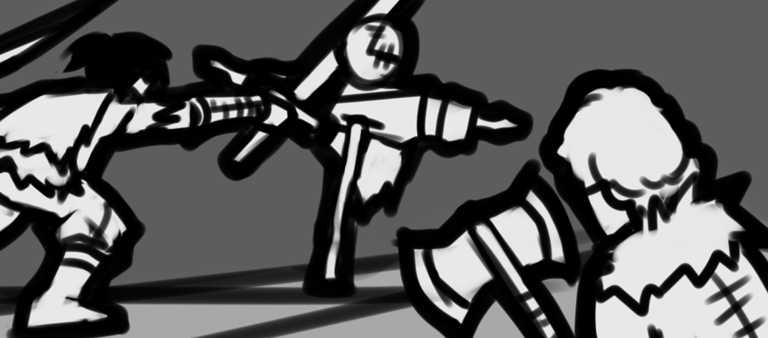

Chapter 6.1 Skill Mechanics
This chapter is a mirror of 6.1 Crafting Skills, as both crafting and combat skills function the same, except the tools/constructions are different. (Workstations for crafting and training targets for combat)
Skills - Unlock via Context
As players engage with content they unlock skills when the right triggers are met. Most combat related skills will progress by using a type of equipment and skill in battle, but some may be unlocked by engaging certain monsters a number of times, or who you are providing combat services to.
Skill Proficiency
Using a skill adds to its proficiency, and adds to your character's legacy in that category. It can apply bonuses up until max value. At max value, you get a slight increase to that legacy category when it increases. Skills of the same category stack benefits together. Weapons, equipment, armor, gain buffs in that skill category.
Skill Types and Progression
Skills may unlock a single new ability, others are skill sets unlock many things all at once. Some skills will get stat and affect bonuses for having other skills active, completing a themed set, be performed by specific weapons, or more. Benefits can be stacked with weapons/equipment/tools, traits, and other related skills. Many skills have linear leveling systems as a form of skill progression, unlocking new skills or skill sets as you gain skill proficiency and legacy.
Skill (standard)
Combat Examples (Move)
Swing charge (horizontal)
Speed burst
Taunt
Crafting Examples (craft)
Wooden pitfall trap
Mason workbench
Marble bridge
Skill Sets
Movesets for combat
Blueprints for crafting
Combat Examples (Movesets)
Beginner swordplay -> Intermediate swordplay -> Advanced swordplay
Fast step -> Ariel agility -> Air manipulation
Quick dagger
Crafting Examples (Blueprints)
Sandune survival (wood) -> Sandune village buildings (wood) -> Sandune town buildings (wood) -> Sandun city buildings (wood)
Basic forge set (blueprints) -> Intermediate forge set (blueprints) -> Advanced forge set (blueprints)
Tundra dragon armor (blueprints)
Written Crafts
Players have limited skill slots. They can optionally create written crafts that allows a player to hold more skills in case they need them later. When near written crafts, such as when placed on workstations, or near combat training dummies, players can reassign their active slots. Players will not lose proficiency, since that is saved to a player's legacy.
Written Crafts Unlock
Players will unlock written crafts as soon as they no longer have room for a skill unlock. Active, but unslotted skills remain active for 12 hours in-game hours, for a player to play around with their skills, create written crafts. This timer pauses when a character is offline. (Note, if a player unlocks multiple skills at the same time, and not all can be assigned, it won't automatically assign.)
Written Craft Limitations
Players can only craft written crafts when that skill is active. So they need to keep their written crafts safe, or they may lose access to past skills. With resources, make copies of their own existing crafts, and repair their damaged ones. (Skill Scribe trait and skill can make copies of other skill crafts that aren't theirs.)
Unlocking Skills Slots to Max
Players start with a handful of empty slots at game start. In the beginning, skills will automatically slot into an empty slot if there is enough room. You will gain 1 new slot per a certain amount of legacy gained, and as well as every hour played in game, until max total slots. Legacy gaps intend to have the same numerical value between new unlocks. This timer and progression never resets or lessens based on defeat/resurrection. In fact, who knows, you might find some hidden skill if you go unconscious in specific locations.
Teaching and Learning Basics
Players can also teach players an active skill, as if they themselves were a written craft. The learning player needs to complete a progression bar of that craft/combat skill for it to activate an unlock. So if their proficiency is low, it will take them longer, but not impossible to learn something. For crafter this appears as the craft being complete, for combat the player learning needs to break the training target. (If another player breaks it before then, the progress bar is saved, and a new target just needs to be used to continue.)
Skills Accumulation
Skills saved, along with player traits and legacy create a basic archetype snapshot of your character. This will (eventually) allow the game to consider challenges like monsters and world events for claims. that the game will nod to.
Starting Skills
Starting skills are skills that are unlocked by default, that players can't unlearn, so they aren't locked out of basic functions.
Unlock Contexts to Consider:
Triggering, completing or being apart of a specific quest or world event
Maintaining, repairing, and/or upgrading specific constructions
Defeating specific monsters via combat or offerings, quantity may be a factor
Interacting with creatures and plants, killing or foraging off of them, alive or dead
Encountering artifacts, deities, phantoms, NPC
Interacting with certain items or constructions
Crafting while being taught, or using a skill book/reference
Performing specific actions
Having a specific skill or skillsets active
Not having a specific skill or skillsets active
Having a trait selected at character creation and stacking an active related skill
Your ecology locality
Or a combination of above, may be with or without needed prerequisites
Your legacy total/category value, and/or a value of your skill proficiency
Engaging with certain mechanics (festivals, crime, trials, bounties, rituals, etc.)
Core Skill Window
You can also see your slotted and merely passively active skills from an unlock from your core skill window. Slotted skills will gain proficiency, and will take on bonuses based on a legacy category if applicable. By setting the skill in an active slot, you are putting it into your character's memory. Unlocked skills are temporarily active, but are unslotted until assigned. Overtime, unslotted skills will fade from memory.
Forgetting Warning
A player will be warned that they are about to forget a skill in the UI. Even if a skill is unslotted, it is still active until it fades (journal shows the page faded, and the icon is faded.) Players can create a written craft with any active skill, even if unslotted.
Journal Entries Skills View
When all the context matches a skill, you gain a new journal entry. In your journal, it is worded as a character's inspiration to learn something new. Journal entries and the core skill window will both have skills and all info about it, and full ability to assign and reassign skills, just in different formats.
Organizing Skills
You can see all your active skills (slotted and unslotted) in the "all skills" tab. From there you can organize and filter it as a base to organize your skill tabs. You can add new tabs, rename them, and recolor tabs. Organizing skills is optional, since workstations will filter what you can and can't create based on the materials and other options available.
